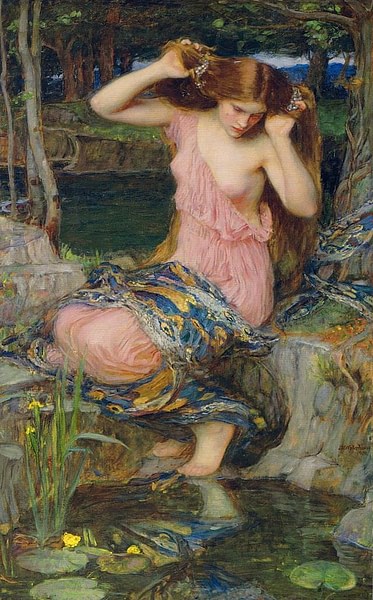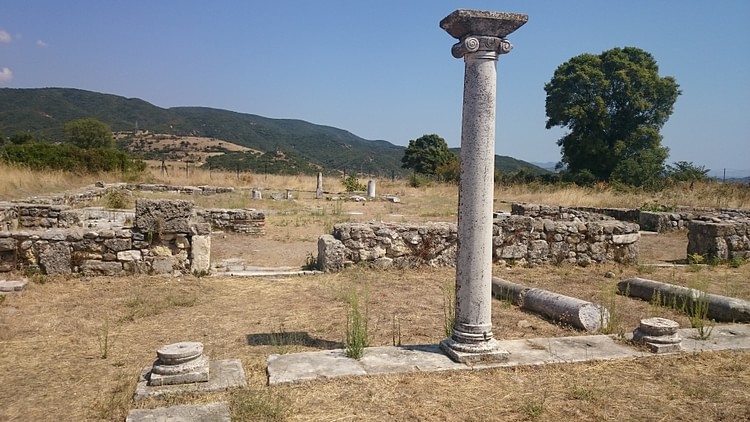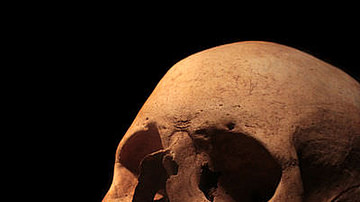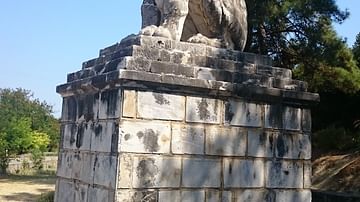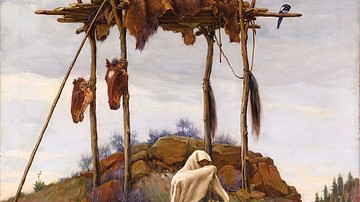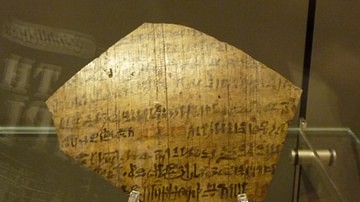Ghost stories have existed for thousands of years, often in similar forms and frequently dealing with the same themes, in many of the most ancient cultures. The writer H.P. Lovecraft once wrote, "As may naturally be expected of a form so closely connected with primal emotion, the horror-tale is as old as human thought and speech themselves." The human desire to defeat death, to live forever, found expression through stories of those who seemingly had done so by returning from the grave.
Still, to the ancients, these tales were not some kind of psychological expression of a basic human desire but illustrated the reality of the human condition. Those who had died could come back to the land of the living if the gods who ruled the underworld gave them special permission under the right circumstances.
The Tale of Philinnion & Machates
One of the oldest of these stories in the west is the tale of Philinnion and Machates from ancient Rome as told by Phlegon of Tralles (2nd century CE) and later by Proclus (5th century CE). The story is reported to have taken place during the reign of Philip II of Macedon (359-336 BCE). In this tale, the maiden Philinnion is the daughter of Demostratos and Kharito of Amphipolis. She is married to a general in Alexander's army named Craterus and dies six months after the wedding. She then appears, in bodily form, in the home of her parents where she "consorts" for three nights with a young man named Machates who was a guest there.
When she is finally seen by another member of the household and her parents discover her, she claims that what she has done was approved of by the will of the gods of the underworld and her parents should not have interfered with her; having given her explanation, she then dies a second time. Her parents, thinking that perhaps this woman is simply an imposter who looks exactly like their dead daughter, order her tomb opened and find her body missing. Further, the trinkets she gave to Machates during their time together are identical to those which were buried with her and which, of course, are also missing from the tomb, while the gifts he had given to her during their nights together are found there. The conclusion is that, somehow, Philinnion came back to life for purposes which are never specified.
Background to the Tale
The story is written in the form of a letter and is careful to give enough detail so it could be believed (the events take place in the reign of Philip II in the city of Amphipolis) but not enough that an individual acquainted with the specifics of the history of Amphipolis would have cause to doubt it.
The letter is supposedly written by one Hipparchus, a civil authority in Amphipolis, to a friend and colleague named Arrhidaeus, asking advice on whether he should report the events to the king. Phlegon chose a civil authority as his eye-witness-narrator in order to encourage belief in the validity of the story and, in case that did not work well enough, steadily increases the number of those who saw the resurrected Philinnion from one (Machates) to two (the nurse) and on up until the whole community is aware of the situation.
Theologian Deborah Prince writes, "the truth of the tale of Philinnion, a young woman who secretly met with a young man at night after she had died and been buried, is asserted most strongly by means of the multiplication of witnesses in increasingly large numbers" (27). This technique in ancient storytelling, Prince points out, is quite common in ancient writings concerning mirabilia (wondrous events or miracles) to encourage acceptance of the story by a reader.
Naumachius of Epirus, who is named by Phlegon as his source for the story, seems to have employed the same technique of providing a number of witnesses to the event. Phlegon claims that Naumachius lived two centuries before him, and scholars assume that, if this is so, then readers of Phlegon's account of Philinnion would have known the story even if they had heard it in another form with different details.
The beginning of Phlegon's version is missing from extant manuscripts and begins at the point where the nurse of the house sees Philinnion sitting on Machates' bed but, according to the scholar J.R. Morgan (in Hodkinson's book), Phlegon's audience would not have needed a beginning to understand the story; they would have already known the characters and the dramatic situation and would have read or listened to the story simply because it was so popular. This popularity endured and inspired Goethe's poem Die Braut von Korinth (The Bride of Corinth) which was published in 1797 CE and remains popular in the present day.
Philinnion as Early Vampire
The tale of Philinnion and Machates is not considered exactly a ghost story by some (Goethe among them), as it shares much in common with stories concerning the Lamia, a kind of female vampire who sucked the blood from the victims she seduced. Goethe's poem is considered a classic of vampire literature as is the ancient tale that inspired it, even though Philinnion is not a vampire according to modern understanding.
Ghosts in ancient Greece and Rome (and other cultures) were thought to need human blood to sustain themselves, and the Lamia was simply a much more dangerous spirit than others. The Lamia figure appears in stories from many cultures and notably in the famous story from Chinese literature of Ning and Nie, where the ghost of the blood-drinking maiden is so impressed by the virtue of Ning, the young man who resists her attempts to seduce him, that she experiences a change of heart and is rescued from death and returned to life.
Text of the Tale
No such happy ending is provided by the tale of Philinnion and Machates. The following version of the story comes from Phlegon of Tralles as related in his Book of Marvels which collected tales concerning ghosts and other events that, today, would be defined as "paranormal". As noted, the story begins at the point where the nurse of the house, the woman who would have primarily raised Philinnion, sees her sitting on Machates' bed and runs to tell her parents:
The nurse went to the door of the guest room, and in the light of the burning lamp she saw the girl sitting beside Machates. Because of the extraordinary nature of the sight, she did not wait there any longer but ran to the girl's mother screaming, `Kharito! Demostratos!' She said they should get up and come with her to their daughter, who was alive and by some divine will was with the guest in the guest room.
When Kharito heard this astonishing report, the immensity of the message and the nurse's excitement made her frightened and faint. But after a short time the memory of her daughter came to her, and she began to weep; in the end she accused the old woman of being mad and told her to leave her presence immediately. But the nurse replied boldly and reproachfully that she herself was rational and sound of mind, unlike her mistress, who was reluctant to see her own daughter. With some hesitation Kharito went to the door of the guest room, partly coerced by the nurse and partly wanting to know what really had happened. Since considerable time—about two hours—had now passed since the nurse's original message, it was somewhat late when Kharito went to the door and the occupants were already asleep. She peered in and, though she recognized her daughter's clothes and features, but inasmuch as she could not determine the truth of the matter, she decided to do nothing further that night. She planned to get up in the morning and confront the girl, or if she should be too late for that, she intended to question Machates thoroughly about everything. He would not, she thought, lie if asked about so important a matter. And so she said nothing and left.
At dawn, however, it turned out that by divine will or chance the girl had left unnoticed. When Kharito came to the room she was upset with the young man because of the girl's departure. She asked him to relate everything to her from the beginning, telling the truth and concealing nothing.
The youth was anxious and confused at first, but hesitantly revealed the girl's name was Philinnion. He told how her visits began, how great her desire for him was, and that she said she came to him without her parents' knowledge. Wishing to make the matter credible he opened his coffer and took out the items the girl had left behind - the golden ring he had obtained from her and the breast-band she had left the night before.
When Kharito saw this evidence she uttered a cry, tore her clothes, cast her headdress from her head and fell to the ground, throwing herself upon the tokens and beginning her grief anew. As the guest observed what was happening, how all were grieving and wailing as if they were about to lay the girl into her grave, he became upset and called upon them to stop, promising to show them the girl if she came again. Kharito accepted this and bade him carefully keep his promise to her.
Night came on and now it was the hour when Philinnion was accustomed to come to him. The household kept watch wanting to know of her arrival. She entered at the usual time and sat down on the bed. Machates pretended that nothing was wrong, since he wished to investigate the whole incredible matter to find out if the girl he was consorting with, who took care to come to him at the same hour, was actually dead. As she ate and drank with him, he simply could not believe what the others had told him, and he supposed that some grave-robbers had dug into the tomb and sold the clothes and gold to her father. But in his wish to learn exactly what the case was, he secretly sent his slaves to summon Demostratos and Kharito.
They came quickly. When they first saw her they were speechless and panic-stricken by the amazing sight, but after that they cried aloud and embraced their daughter. Then Philinnion said to them : `Mother and father, how unfairly you have grudged my being with the guest for three days in my father's house, since I have caused no one any pain. For this reason, on account of your meddling, you shall grieve all over again, and I shall return to the place appointed for me. For it was not without divine will that I came here.' Immediately upon speaking these words she was dead, and her body lay stretched visibly on the bed. Her father and mother threw themselves upon her, and there was much confusion and wailing in the house because of the calamity. The misfortune was unbearable and the sight incredible.
The event was quickly heard through the city and was reported to me. Accordingly, during the night I kept in check the crowds that gathered at the house, since, with news like this going from mouth to mouth, I wanted to make sure there would be no trouble.
By early dawn the town assembly was full. After the particulars had been explained, it was decided that we should first go to the tomb, open it, and see whether the body lay on its bier or whether we would find the place empty. A half-year had not yet passed since the death of the girl. When we opened the chamber into which all deceased members of the family were placed, we saw bodies lying on biers, or bones in the case of those who had died long ago, but on the bier onto which Philinnion had been placed we found only the iron ring that belonged to the guest and the gilded wine cup, objects that she had obtained from Machates on the first day.
Astonished and frightened, we proceeded immediately to Demostratos's house to see if the corpse was truly to be seen in the guest room. After we saw the dead girl lying there on the ground, we gathered at the place of assembly, since the events were serious and incredible.
There was considerable confusion in the assembly and almost no one was able to form a judgment on the events. The first to stand up was Hyllos, who is considered to be not only the best seer among us but also a fine augur; in general, he has shown remarkable perception in his craft. He said we should burn the girl outside the boundaries of the city, since nothing would be gained by burying her in the ground within its boundaries, and perform an apotropaic sacrifice to Hermes Khthonios and the Eumenides. Then he prescribed that everyone purify himself completely, cleanse the temples and perform all the customary rites to the Khthonion [underworld] gods. He spoke to me also in private about the king and the events, telling me to sacrifice to Hermes, Zeus Xenios, and Ares, and to perform these rites with care. When he had made this known to us, we undertook to do what he had prescribed. Machates, the guest whom the ghost had visited, became despondent and killed himself.
If you decide to write about this to the king, send word to me also in order that I may dispatch to you one of the persons who examined the affair in detail. Farewell.
Conclusion
The story, besides entertaining, would have encouraged belief in the audience of two important cultural values: that the dead continued to exist after death and that the living should remember and honor them but give no thought to entertaining them. The dead were supposed to remain in the realm of the afterlife and the literature of every ancient civilization makes clear that the appearance of a "ghost" - except in dreams and under certain conditions - was a sign that something had gone terribly wrong.
This belief persisted through the ages - and is still held today - and is probably best exemplified by the character of Hamlet in Shakespeare's play of the same name. Hamlet suspects that the spirit he has seen on the ramparts, which so resembled his father, may be a devil (Act II.ii, line 690-691). He refuses to act on what the spirit has told him to do (avenge his father's death) precisely for this reason because he knows it is possible the devil is trying to trick him into killing his uncle in order to damn him to hell.
In the same way, the story of Philinnion and Machates warns against trusting anyone who returns from the realm of the dead; no good comes from Philinnion's visitation and Machates eventually kills himself because of it. That the dead continued to exist after they had departed life was a given; to entertain them if they returned, however, was never a good idea.
